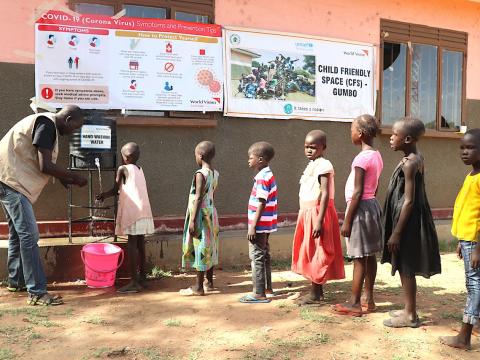Handwashing can’t stop – millions of lives are at stake
Global Handwashing Day might seem a bit niche as international days go; you’d certainly be forgiven for never having marked it. But this year, today, it’s taken on a new urgency for millions of vulnerable children.
The coronavirus pandemic has built a fresh appreciation for clean, running water and soap in those of us fortunate enough to have access to them. Washing our hands more regularly is now second nature; maybe even humming the ‘happy birthday’ song twice to make sure we hit the 20-second recommended mark.
But this most simple of acts remains beyond the reach of millions of families around the world, and it’s putting their lives on the line. In 2019, three billion people lacked access to a handwashing facility with soap and water, including three quarters of those living in sub-Saharan Africa. Globally, one in three health care facilities do not have hand hygiene facilities at points of care.
Staggeringly, if world leaders don't continue to invest in handwashing, we risk continuing to see more than a million children under five years old dying unnecessarily every single year.
It’s a stark warning. Thoroughly cleaning hands with soap or an alcohol-based hand rub helps prevent a range of diseases, including the biggest killers of under-fives globally: pneumonia and diarrhoea. These two diseases combined kill approximately 1,250,000 young children each year.
“Hands, face, space” has become the new mantra of the UK government’s campaign to prevent the virus. And as more countries re-open after lengthy lockdowns, continued handwashing is crucial to help reduce the spread of COVID-19 – while at the same time helping to prevent other killer diseases. But this will happen only if countries build on the increased investment in handwashing inspired by the pandemic.
Good hand hygiene is relatively cheap, and a cornerstone of safe and effective health care. Through the WHO/UNICEF Hand Hygiene for All initiative, we are urging global leaders to do everything they can to ensure it is both possible and promoted in homes, schools, healthcare facilities, care homes, workplaces and in public areas. Governments, community and faith leaders, the private sector, and others who can influence hygiene habits must take the lead in this. Otherwise we risk a deadly, continuous cycle of COVID-19, the genesis of further pandemics, and more needless deaths due to other infectious diseases.
We are at a critical juncture – what the global community does or does not do to sustain handwashing now could save or kill millions of vulnerable children, slow or drive the spread of antimicrobial resistance and also determine the first line of defence for adolescents, adults and the elderly. Prior to COVID-19, handwashing with soap after using the toilet was reported at just 19 per cent globally. Investments in handwashing have increased significantly over the past few months as leaders have attempted to quickly stem the spread of the virus. One US study indicated the percentage of Americans who reported washing their hands six or more times per day increased from 37 per cent pre-coronavirus to 78 per cent in April 2020.
However, without durable, affordable, accessible and convenient ways for the most vulnerable to wash their hands, and policies that encourage it into the future, we fear that this vital behaviour will return to low pre-pandemic levels once the threat of COVID-19 subsides, or even before as the threat of behavioural fatigue looms.
Many aid agencies and governments are focusing on temporary solutions, such as trucking in water or distributing buckets. But if these are targeted only at this current crisis and fail to consider long-term sustainability, they will likely fail to bring about the lasting change needed to address other deadly diseases. Access to clean water and hygiene facilities must be urgently prioritised for every person, especially the most vulnerable families, with infrastructure built so this access is permanent. Crucially, creative and compelling messaging is desperately needed in many communities to motivate people to adopt hand hygiene as a critical life-long habit.
As we face a second wave of COVID-19, good hand hygiene benefits us all. But we can’t afford to return to business as usual when the virus no longer poses a threat; to do so would be to abandon the most vulnerable. Our message to world leaders is this: we have an opportunity to turn the tide on the major killers of children globally. We must not fail them.
Bruce Gordon is Unit Head of Water, Sanitation, Hygiene and Health (WASH) at the World Health Organisation and Ray Norman is Global Sector Lead for WASH at World Vision International
